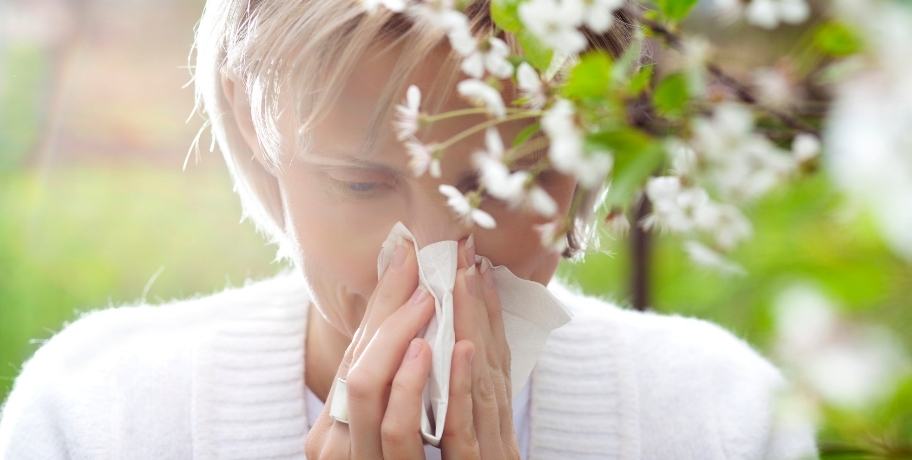
Pollen allergy, also known as hay fever or allergic rhinitis, can be really unpleasant, causing everything from mild to severe symptoms like red, itchy eyes, runny nose, nasal congestion, sneezing, and severe fatigue, as well as asthma symptoms. Pollen from birch, grass, and ragweed are the most common allergens. Pollen allergy is common, affecting around 30% of all Swedes. Pollen season is usually divided into three seasons:
- Spring - tree pollination season when deciduous trees bloom
- Summer - grass pollen
- Late summer/autumn - ragweed
What happens in the body during pollen allergy?
Pollen, also known as seed dust, is the male part of flowers or coniferous trees involved in their fertilization. In a person with pollen allergy, proteins in the pollen bind to antibodies in the body, causing cells to release histamine, prostaglandins, and several other substances in the body in excess. Therefore, an allergic reaction occurs because the immune system overreacts to the pollen.
Common pollen allergy advice
There are some common tips for dealing with pollen allergy that most people know but are worth mentioning.
- Have a clean, dust-free, and pollen-free bedroom.
- Change your sheets frequently and never sit in bed with clothes you've worn outside.
- If you've been outside, change clothes, take a shower, and rinse pollen out of your hair.
- Don't store clothes that you've worn outside among clean clothes or in the bedroom.
- Ventilate late in the evening when the pollen count is low.
- Get pollen nets for your windows so you can ventilate.
- Rinse your nose to clear out pollen.
- Vacuum and wet clean frequently.
- Exercise, as it reduces the inflammation molecule Interleukin-4 in the nose.
In addition to the tips above, there are some important supplements that research shows can alleviate pollen allergy symptoms.
Take Probiotics for Pollen Allergy
Research shows that probiotic supplements reduce allergic symptoms both in the nose and other parts of the body caused by pollen allergy. Short-term consumption of the Lactobacillus paracasei strain can counteract, among other things, nasal congestion and reduce various inflammatory molecules from pollen. Lactobacillus paracasei is found in our Flora Plus+ probiotic.
Dosage: 20-40 billion CFUs/day taken with food.
Take Vitamin C and Quercetin for Pollen Allergy
Research shows that oxidative stress plays a role in the pathophysiology of pollen allergy. A placebo-controlled study that lasted for 1.5 years showed that people who took 1 gram of vitamin C per day had significantly fewer pollen allergy symptoms compared to those who took a placebo. The flavonoid quercetin has an effect on pollen allergy. The recommendation is to take vitamin C with quercetin.
Dosage Vitamin C: 400-1200 mg/day spread out over 1-3 different occasions.
Dosage Quercetin: 250-750 mg/day spread out over 1-3 different occasions.
Take Vitamin D for Pollen Allergy
Vitamin D contributes to a normal immune system, but it also functions as a so-called modulator in pollen allergy. People with vitamin D deficiency, which is not uncommon in Sweden, have milder pollen allergy symptoms after taking vitamin D supplements for three months. Researchers have also found that the lower the levels of vitamin D in a group of patients, the higher the proportion with allergic rhinitis.
Dosage Vitamin D: 70-80 IU per kilogram of body weight per day from all sources. Normally, 4000-5000 IU per day is recommended during the winter months.
Take the Minerals Calcium, Zinc, Magnesium, and Copper for Pollen Allergy
Research shows that a lack of zinc exacerbates allergic reactions in the airways. Copper is needed to form the enzyme DAO, which breaks down histamine. If you have a copper deficiency, you can experience exaggerated histamine reactions. A lack of magnesium and calcium can also lead to excessive histamine reactions.
Dosage Magnesium: 300 mg/day
Dosage Calcium: 500 mg/day
Dosage Zinc: 22.5 mg/day
Dosage Copper: 2 mg/day
Diet and Sleep for Pollen Allergy
Good diet and sleep are crucial to alleviate any health problems. Follow our protocols for a healthy diet and tips for optimal sleep. Email us at [email protected] to get these tips and advice for free.
Anecdotal Evidence
We have customers who experience reduced pollen allergy symptoms when taking MSM. Here's what Jenny wrote to us:
“MSM is my new favorite! I'm so happy I tried it despite critical voices from friends who experienced terrible cleansing symptoms. I started slowly just as you advised me to. I only take one capsule a day and my birch pollen allergy is practically gone. I sneeze only once in a while, but otherwise, it's non-existent.”
Pollen Allergy and Cross-Reactivity
Cross-reactivity, or reactions to foods that contain similar proteins to those you're allergic to, is not uncommon.
Birch Pollen and Cross-Reactivity
Apricots, cherries, curry, hazelnuts, strawberries, peanuts, kiwi, almonds, carrots, nutmeg, nectarines, walnuts, pears, peaches, parsley, plums, potatoes, celery, soybeans, and apples
Grass Pollen and Cross-Reactivity
Oats, peanuts, kiwi, onions, corn, melon, rye, rice, soybeans, tomatoes, wheat flour, and peas
Ragweed Pollen and Cross-Reactivity
Fennel, coriander, carrots, parsley, celery, and mustard.
